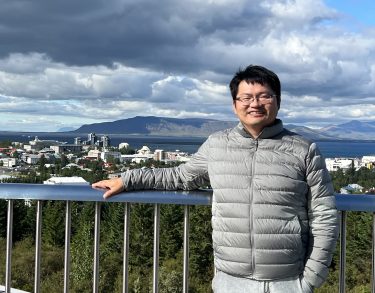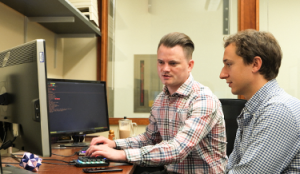By UW-IT News & Announcements
Xiao Zhu, a research computer expert with the knowhow to help other researchers across the University of Washington to meet their evolving computing needs, is UW-IT’s new Associate Vice President for Research Computing.
“It is my belief that Xiao will skillfully support the UW in its role as a world leader in research,” said Andreas Bohman, UW-IT’s Vice President for UW Information Technology and CIO. “I am also confident that Xiao’s commitment to fostering innovation, collaboration and diversity in higher education will be a significant contribution to the UW’s mission and vision.”
Zhu was chosen from among a strong field of finalists to lead the new Research Computing Division in UW-IT, which reorganized in the past year to better serve the University’s needs.
UW and UW-IT leaders recognize that research computing is a key differentiator for the UW and it needs to continue to grow in this area to meet the needs of an innovative and fast-moving research community.
The Research Computing Division’s primary mission is to empower and facilitate groundbreaking research, foster innovation and support researchers across the university.
One of its goals is to provide the best computing resources available, in-house tools and expertise and unwavering support to everyone, whether they’re seasoned researchers or students just getting under way.
Through its new division, UW-IT is committed to enabling best practices that not only enhance the quality of research outcomes but also mitigate funding risks associated with computational endeavors.
“I am thankful to everyone who participated in the selection process,” Bohman said. “I especially appreciate the work from the recruiting firm Next Generation Partners, LLC and the search committee chaired by Xiaosong Li, Associate Vice Provost for Research Cyberinfrastructure, and made up of leaders across the University.
Xiao’s experience, in both the private and public sectors, encompasses research computing leadership, deep technical expertise, and securing external funding for research infrastructure. Most recently, he served as Senior Technical Consulting Engineer at Intel, where he was immersed in innovative technologies that support research computing.
Xiao’s education includes earning a Ph.D. in Computational Chemistry from the University of Wisconsin-Madison and an MBA from Purdue University, his employer prior to Intel. Xiao also holds a Bachelor of Science in Polymer Materials and Engineering from the University of Science and Technology of China.
While at Purdue as a Senior Research Scientist, Xiao designed and delivered cost-effective services to meet the evolving cyberinfrastructure needs of researchers, including the deployment of GPU resources for ML/AI. He also played a pivotal role in securing over $20 million in funding from the National Science Foundation, which facilitated deployment of the Anvil Supercomputer for the national science and engineering community.
Additionally, at the Texas Advanced Computing Center, Xiao was instrumental in deploying and later enhancing one of the world’s most powerful supercomputers at the time, while providing support to scientific computing communities.

